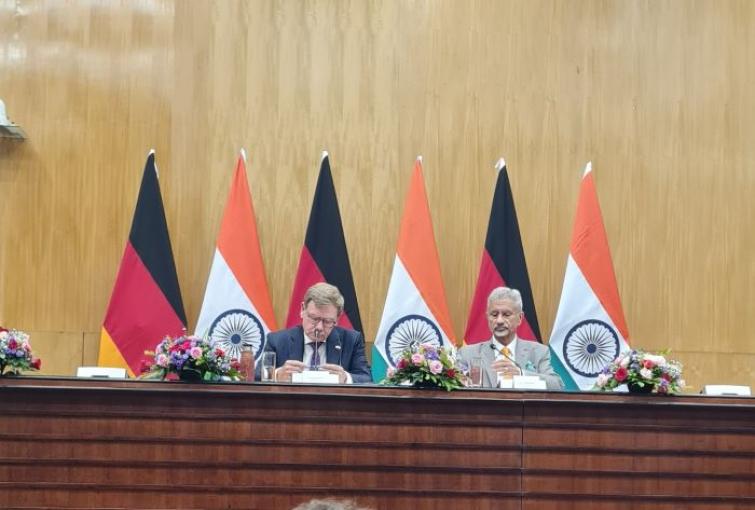 New Delhi:
New Delhi: Germany on Tuesday urged India to leverage its ties with Russia to help revive peace talks on Ukraine, while India pressed its concerns on terrorism, trade barriers, U.S. tariffs, and the sensitive case of Indian toddler Ariha Shah in German foster care. The exchanges came during a joint press conference addressed by German Foreign Minister Dr. Johann Wadephul and India’s External Affairs Minister Dr. S. Jaishankar in New Delhi.
Call for Peace in UkraineIn his remarks, Dr. Wadephul made a pointed appeal for India to play a mediating role. “The only demand is that weapons fall silent,” he said. “President Zelenskyy has shown openness to peace, but Russia has not responded. We believe India, with its special channels to Moscow, can make a difference in bringing both sides to the table.”
Dr. Jaishankar responded by reiterating India’s cautious but consistent position on the conflict. “We have always called for de-escalation and dialogue,” he said. “Peace is not just a political necessity—it is also critical for stabilizing energy markets and ensuring global economic resilience.”
India has faced criticism in the West for continuing to import discounted Russian oil despite sanctions. Jaishankar defended those purchases as necessary for a country of India’s size, framing them as part of a broader debate on global energy equity.
Defence and Counter-TerrorismOn regional security, the ministers highlighted the growing scope of India–Germany defence ties. Germany’s participation in the Tarang Shakti air exercises and German naval port calls in Goa were cited as significant milestones.
Jaishankar, while recalling Germany’s political support after India’s Operation Sindoor against terrorist groups, made a strong point. “India appreciates Germany’s candid support of our right to defend ourselves against terrorism,” he said. “This is not only a matter of national security for us but also of global security.”
Dr. Wadephul described India as “a pillar of stability in Asia” and promised that Berlin would expand defence cooperation further, with smoother clearances for defence industry linkages and technology sharing.
Trade, Tariffs, and the EU DealEconomic cooperation emerged as another key theme. Bilateral trade reached nearly €50 billion last year, and both sides agreed to double that figure in the coming years. But the long-delayed India–EU Free Trade Agreement loomed large.
“We count on Germany’s support to expedite negotiations,” Jaishankar said. “It is crucial that this agreement is concluded in a timely manner.”
At the same time, he flagged mounting challenges from U.S. protectionism, especially tariff hikes linked to India’s energy imports from Russia. “Energy security for a country of our size is a legitimate necessity,” Jaishankar asserted. “Our partners must recognize this reality rather than penalize it.”
Wadephul reassured Berlin’s backing for the FTA. “I personally support the Indo-EU free trade agreement,” he said. “It is in Europe’s interest, and Germany will push to make this happen.”
The Ariha Shah CaseIn a rare personal intervention at the press conference, Jaishankar raised the case of two-year-old Ariha Shah, an Indian child who has been in German foster care since 2021 after an accident at her home in Berlin. India has repeatedly pressed for her return on cultural and humanitarian grounds.
“This remains an issue of concern for us,” Jaishankar said firmly. “We believe the child’s cultural and national roots should be respected, and we continue to engage with German authorities on her repatriation.”
Dr. Wadephul was cautious in his reply, noting that “all cases involving children are dealt with sensitively under German law,” but he assured that Berlin would continue dialogue with New Delhi on the matter.
Strategic VisionWadephul placed the discussions in a broader global context, arguing that shifting geopolitics demand closer India–Germany ties. “There are big changes underway in the world,” he said. “These changes make a compelling case for a deeper, stronger, wider India–Germany relationship.”

